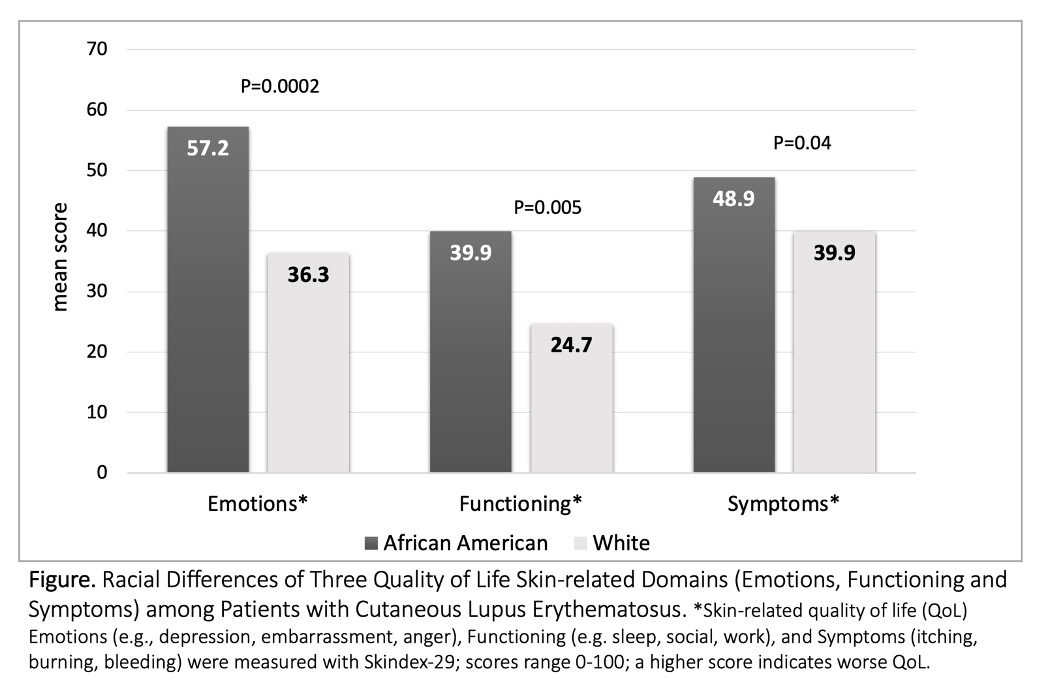Session Information
Date: Sunday, November 8, 2020
Title: Epidemiology & Public Health Poster III: Inflammatory Rheumatic Disease
Session Type: Poster Session C
Session Time: 9:00AM-11:00AM
Background/Purpose: Chronic stress may trigger or exacerbate physiologic pathways that worsen individual health and wellbeing. Stress is associated with the development and progression of skin conditions; however, little is known about its role in the quality of life (QoL) of people with cutaneous lupus erythematosus (CLE). African American (AA) patients with CLE are more likely to be exposed to psychosocial stressors and may have worse QoL than whites. We examined racial differences in three skin-related QoL domains and explored the relationship between QoL, psychosocial stress, and race in patients with CLE.
Methods: We conducted a cross-sectional assessment among AA and white patients with a dermatologist-validated diagnosis of chronic or subacute CLE consented into the Georgians Organized Against Lupus (GOAL) study, a population-based cohort of individuals with lupus in the Southeastern U.S. The Skindex-29, a 5-point Likert scale was used to assess three skin-related QoL domains (emotions [e.g. depression, embarrassment, anger], functioning [e.g. sleep, social, work] and symptoms [e.g. itching, burning, bleeding]), with a higher score (range 0-100) indicating worse QoL of the domain being measured. Psychosocial stress was measured using validated patient-reported tools for disease-related stigma (PROMIS Stigma Short Form) and stress (Cohen self-perceived stress scale). For each skin-related QoL domain, three iterative multiple regression models were built to examine 1) stigma and stress, 2) these relationships controlling for demographic factors, and 3) with the addition of 2 disease-related factors.
Results: We examined 238 patients with CLE (chronic CLE (n=229); subacute CLE (n=9)), of whom 139 (58.4%) lacked systemic manifestations, and 99 (41.6%) had an associated diagnosis of systhemic lupus erythematosus (SLE). The large majority were females (n=208, 87.4%) and AAs (201, 84.5%). Mean age and disease duration were 48.5 and 11.6 years, respectively. AAs had significantly worse QoL (emotions, functioning and symptom scores) compared with whites (Figure). Multivariable models revealed that both stigma and stress were independently associated with worse QoL in each domain, with little attenuation after controlling for race, other demographics, disease duration, and diagnosis of SLE (Table). AA race and unemployment were additional significant characteristics in the final two models for the emotions domain; for functioning lower education was significant after adjustment.
Conclusion: Our findings underscore significant racial disparities in three major domains of skin-related QoL among people with chronic or subacute CLE. We also highlighted a substantial role of stigma and stress on skin-related emotions, functioning and symptoms in this population. After controlling for multiple factors, skin-related emotions remained substantially worse in AAs, suggesting more susceptibility to psychological stress than whites. Our findings suggest that interventions aimed at reducing stigma and managing stress may be helpful in improving the QoL of individuals with CLE and may ultimately contribute to reduced racial disparities in this population.
To cite this abstract in AMA style:
Drenkard C, Aspey L, Bao G, Gordon C, Theis K, Helmick C, Lim S. Relationship Between Skin-related Quality of Life, Psychosocial Stress, and Race in Cutaneous Lupus Erythematosus [abstract]. Arthritis Rheumatol. 2020; 72 (suppl 10). https://acrabstracts.org/abstract/relationship-between-skin-related-quality-of-life-psychosocial-stress-and-race-in-cutaneous-lupus-erythematosus/. Accessed .« Back to ACR Convergence 2020
ACR Meeting Abstracts - https://acrabstracts.org/abstract/relationship-between-skin-related-quality-of-life-psychosocial-stress-and-race-in-cutaneous-lupus-erythematosus/


